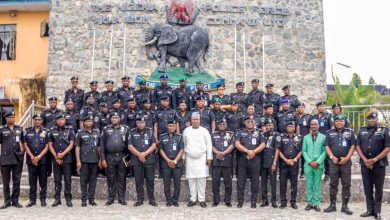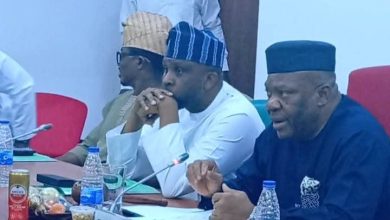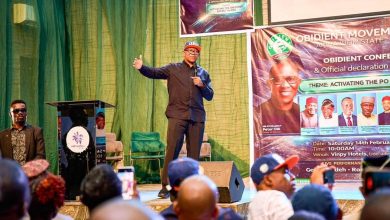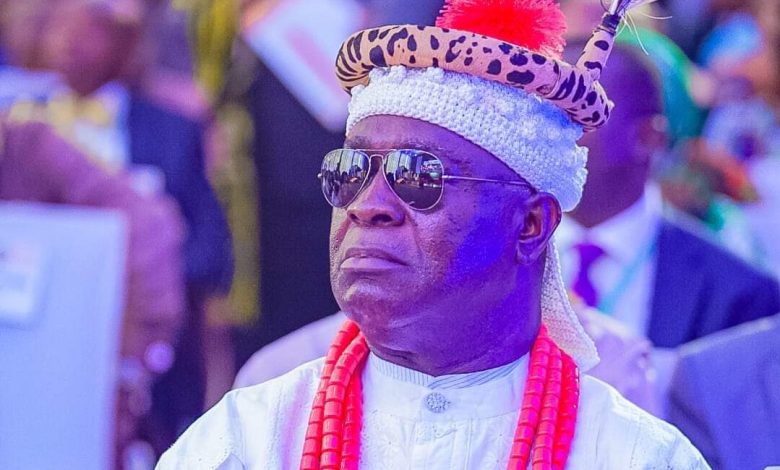
Quite recently, the defeated senatorial candidate for Akwa Ibom North East (Uyo) District, Rt. Hon. Barr. Usenobong Akpabio, laboured unsuccessfully to disprove the amended TRC Law, Cap. 155 of 2022, in Akwa Ibom State.
The piece titled “The Weakening of Traditional Institutions with Legislation: A Critical Look at the Amended TRC Law in Akwa Ibom State,” to say the least, was completely infantile
The more one reads Barr Usenobong Akpabio’s submission on the amended Akwa Ibom State Traditional Rulers Law, the more any lingering doubt about its banality is cleared.
I paused twice while reading the piece to check and recheck if my eyes were playing tricks on me. I had to be doubly sure of the byline attached to the piece. When someone has earned some level of reverence, especially one who doesn’t spew not-well-chewed statements, a sudden digression becomes questionable. I can’t afford to look the other way when the dance steps of a masquerade are not in synchrony with the drumming.
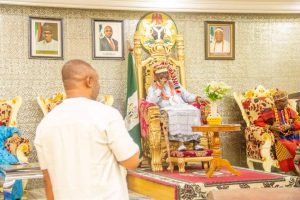
Well, without sounding entirely dismissive, Rt Hon. Barr Usenobong Akpabio, a lawyer, former House of Assembly member, and politician, actually penned beautiful prose. But the glossy piece was garnished with defective logic. Such an essay could pass for a poorly researched high school essay written by a student with a good command of the English language.
Related: Our Stand On The Amended Akwa Ibom State Traditional Rulers Law, Cap 155 Of 2022
What should have been a well-tempered communication became a flawed, mendacious, vitriolic, contradictory, and undignified piece.
Embedded in the copious paragraphs of his piece were just three points: his self-contradiction, his limited knowledge of the traditional institution, and his misguided attack on the House of Assembly.
In what amounted to a clear case of self-contradiction, Usenobong Akpabio glaringly shot himself in the foot by eating his words.
On May 6, 2022, Usenobong, whilst aspiring to represent Akwa Ibom North East Senatorial District in the Senate, led members of his campaign organisation to the Ikot Ukobo, the Palace of His Eminence, Ntenyin (Dr.) Solomon Daniel Etuk, CFR, in Nsit Ubium Local Government Area, seeking royal blessings from the premier monarch and the Ifim Ibom Ibibio.
Usenobong referred to the paramount rulers as his fathers, promising that as a “good son” he would cater for their welfare as well as seek guidance and advice from them if he got to the Red Chambers as an elected Senator.
Related: Sustain Decorum In Your Campaign – Ifim Ibom Ibibio Advises Usenobong Akpabio
He then made a suggestion: “If fathers of faith in churches have woken up to begin to play politics, why should our traditional rulers not know who they want to send to represent the people? They should also be involved in the making process of the representative. Traditional rulers should be involved at a time like this.”
Fast-forward to November 2023, where Usenobong, via his article, dropped the opposite advice. Hear him: “With the body of Christ now unconscionably throwing her hat into the ring of the political arena, the only institution that should be spared the vulnerability and unpredictability of politics and political manoeuvring—one to help maintain the sanctity, identity, and integrity of our ancestry and also help shape and direct our society—is the traditional institution.”
Two contradictory pieces of advice by Usenobong within a short space of time. Quite ludicrous!
A “good son,” as he chose to describe himself in 2022, would never hold his parents’ hands and lead them on a pathway, only to turn around halfway to castigate them for traversing the pathway with him.
What if the traditional rulers had heeded his call for them to become partisan?
Of course, Oku Ibom Ibibio and his Supreme TRC members, in their wisdom, never accepted to follow the path shown by Usenobong Akpabio in May 2022. Today, they have been vindicated.
In a display of presumed humility and respect, he kneeled before the throne of his forebears at Ikot Ukobo, speaking the language of persuasion and reverence.
Today, I wouldn’t say that he is suffering from post-election depression; even if that is his situation, transferring the aggression to traditional rulers is weird because they have no hand in his predicament.
Usenobong proceeded to weave several paragraphs on how “legislation weakens the traditional institution.” By doing so, he, as a lawyer and former legislator, deliberately betrayed his “clan.” I dare say that he knew what he churned out was false.
For the sake of disabusing minds that have been confused, I make bold to say that every traditional stool in the country is a product of legislation. A body of laws enacted by the Houses of Assembly and endorsed by state governors is what grants legality and authority to the traditional stools in the respective states. Villages, clans, local government areas, and the traditional rulers therein are products of legislation. A village can only be recognised if it is gazetted. It flows that way.
Courtesy of the amended TRC Law, Akwa Ibom has simply joined a list of states of the Federation (including FCT) that have permanent representatives in the National Traditional Rulers Council.
The states include Adamawa, Anambra, Bauchi, Benue, Borno, Edo, Gombe, Jigawa, and Kaduna. Kano, Katsina, Kebbi, Kogi, Kwara, Lagos, Nasarawa, Niger, Osun, Oyo, Plateau, Sokoto, Taraba, Yobe, and FCT-Abuja.
Read Also: Elders, Leaders Of Ibibio Socio-Cultural Organisations Laud Gov Eno, AKHA ON Amended TRC Law
In Abuja, where Usenobong is expected to reside as an elected senator, the Ona of Abaji is the life president of the FCT traditional rulers council. It does not mean that other traditional entities and rulers in Abuja are inferior to the Ona and Abaji.
The traditional institution in Akwa Ibom State has not even experienced half of the negative political intrigues compared to places like Kano, where a governor deposed and banished a sitting emir. Or do I recall that Ibrahim Dasuki, the 18th Sultan of Sokoto, was deposed in 1996 during the military government of Sani Abacha? In our nearby Cross River State, we have seen how the powers that be battled a particular traditional throne for supremacy. Not too long ago, a Rivers State Governor infamously vowed to go to jail, seize the crown, or depose paramount rulers who offend the law.
Yet, Usenobong, in his piece, used those climes as a stick to beat the Akwa Ibom State Traditional Institution.
Also, inferring that the Oku Ibom stool and the traditional rulers in Akwa Ibom are political appointees, not monarchs, is patently false.
Chiefs in Akwa Ibom are always chosen from the ruling families in communities.
For instance, His Eminence, Ntenyin (Dr.) Solomon Daniel Etuk, is from the loins of royalty. He inherited the village headship of Ikot Ukobo from his late father.
His late paternal uncle, the late Edidem Robert Obot, was a Paramount Ruler. This process is in tune with what is practised elsewhere.
Usenobong was not done; he also aimed his attack nozzle at the House of Assembly, castigating its members and referring to them as those who have limited knowledge of legislation. But he failed to pinpoint the law flouted by those legislators. Those lawmakers simply authenticated a bill that emanated from the traditional rulers. Simple!
He sounded so inept and pedestrian. He failed in his attempt to present himself as a champion or ambassador of statehood. A closer analysis seems to expose him as a bedfellow of conceited egocentrics and tin-gods who are stunned by the unexpected resurgence of the all-encompassing Akwa Ibom (Old Ibibio).
The waning clique believes the solution to their self-inflicted misfortune is to hijack the traditional institution, create division among a people that belonged to one large umbrella, and perpetrate their insatiable lust for prominence and cornering of our commonwealth. For many reasons, Usenobong shouldn’t befriend them.
The oligarchs are facing the nightmare of watching their anti-Akwa Ibom antics go into oblivion. A false hope arose via this subject matter of traditional law amendment, but it is fast waning.
The few paramount rulers said to have been influenced by tribal tigers have now withdrawn their case against the state government and the Akwa Ibom State Supreme Council of Traditional Rulers from the Court.
The sands of the warmongers are fast sinking. Their mission has paled into a dying dream. Usenobong Akpabio is joining the fray very late. He can’t revive a dead horse. Everything seems done and dusted.
Every writer has a bad day; maybe we should assume that his piece was penned on the wrong day. He must have passed through serious pain trying to build those flawed paragraphs.
A writer puts himself on trial in the court of public perception every time he or she churns out an opinion. Usenobong Akpabio has convicted himself. But I think he should be pardoned. To err is human. Let’s not throw away the baby with the bath water.
But he has to retrace his steps. A child who delights when told by strangers that he is more reasonable than his fathers usually realises late that such was a spite by enemies, not a compliment.

